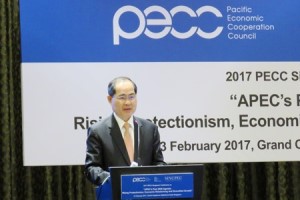 This year's Singapore Conference was co-organized by the Vietnamese and Singaporean committees of PECC with the title, "Post-2020 Agenda: Rising protectionism, economic rebalancing, and diversified growth."
This year's Singapore Conference was co-organized by the Vietnamese and Singaporean committees of PECC with the title, "Post-2020 Agenda: Rising protectionism, economic rebalancing, and diversified growth."
Protectionism is on the rise as trade slows and the blame of job losses and economic slowdown are turned to globalization. Income inequality continues to widen in both developed and developing economies. While middle class purchasing power and consumption are increasing as are activities in the services sector, there is not enough to support the ongoing restructuring of the manufacturing cluster and production value chain. Rapid technological advances that brought radical industrial and lifestyle changes through e-commerce, sharing economy and automation present both opportunities and concerns about the future global economy. In this context, the first plenary will address the need for a coherent approach toward external economic relations.
[photo: Singaporean Minister for Trade, Mr. Lim Hng Kiang at 2017 PECC Singapore Conference]
The panelists of the second plenary reviewed how much progress has been made on each of the five attributes (balanced, inclusive, sustainable, innovative, and secure) of the APEC Growth Strategy since it was adopted in 2010, especially in respect to SMEs, e-commerce, and financial inclusion.
The third and fourth plenary sessions covered the physical, institutional, and people-to-people aspects of the Connectivity agenda that was adopted by APEC Leaders in 2014. Promotion of tourism, education services, improvements in 'ease of doing business,' and ensuring food security were the main focus areas in addressing people-to-people connectivity.
The fifth and last plenary was dedicated to reviewing the Bogor Goals and reshaping the common resolve into another form beyond 2020 when the target date for developing economies to achieve free trade and investment expires. While significant progress has been made on many fronts, some members are still facing the same challenges that have pre-existed while new ones have emerged since. The global economic landscape has changed vastly since Bogor Goals were first announced in 1994, protectionism is on the rise, recovery of major engines of growth remains elusive, export-oriented economies are finding it painful to cope with economic restructuring. With 2020 fast approaching, APEC members need to re-evaluate the original aims of the Bogor Goals and reshape them into new sets of goals in accordance with the changed circumstances.
Mr. Lim Hng Kiang, Minister of Trade of Singapore said in his opening speech, "as we approach the deadline for the Bogor Goals, APEC is at an inflection point." "Amidst a backdrop of sluggish growth and concerns about employment, income inequality and immigration, anti-trade sentiments have been on the rise." While the benefits of globalization may not have been distributed evenly, "we should not make globalization the scapegoat for slowing growth and unemployment," he stressed.
Mr. Bui Thanh Son, Standing Deputy Minister of Foreign Affairs of Vietnam, referred to 2017 as "an unpredictable and critical yera for APEC and the region," in his keynote speech. He added that we were only a few years away from the expiry of Bogor Goals and urged every member economy to join hands to work together and make this year a successful one in the face of many new challenges in the region.
Detailed program agenda is found here.
Related press release

 This year's Singapore Conference was co-organized by the Vietnamese and Singaporean committees of PECC with the title, "Post-2020 Agenda: Rising protectionism, economic rebalancing, and diversified growth."
This year's Singapore Conference was co-organized by the Vietnamese and Singaporean committees of PECC with the title, "Post-2020 Agenda: Rising protectionism, economic rebalancing, and diversified growth."